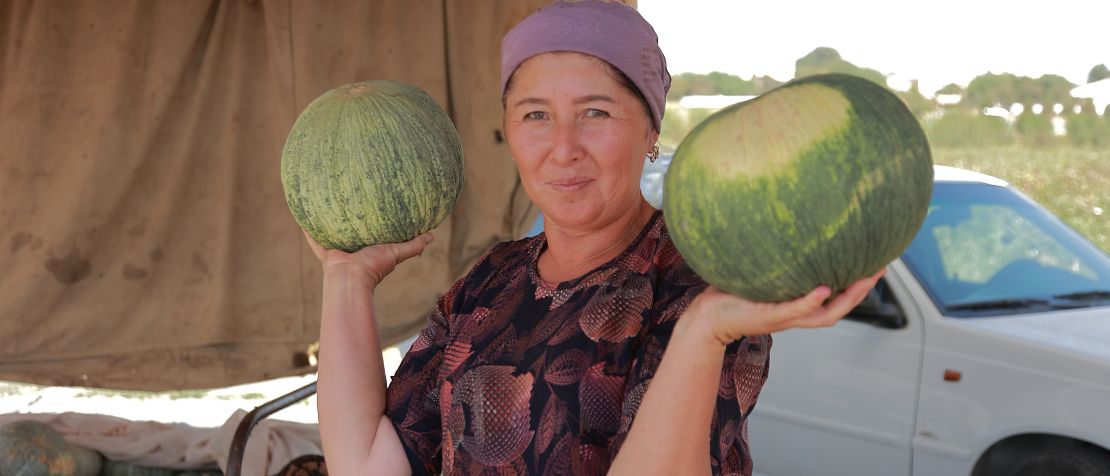FAO scales up its work on gender equality

©FAO/Lazizkhon Tashbekov
Fostering gender equality and rural women’s empowerment are global programme and policy priorities of the Food and Agriculture Organization of the United Nations (FAO). In Europe and Central Asia, the Organization’s efforts are guided by the Regional Strategy for Gender Equality (2019–2022). Now, as the timeframe for the document runs out and, given the new challenges that have emerged in the past years, it is time to discuss the way forward.
A two-day regional workshop, convened by FAO in a hybrid modality, is bringing together a wide range of its staff engaged in technical and programme work at country and regional levels to share information and knowledge, as well as to shape the next phase of the regional strategy and action plan on gender mainstreaming up to 2026.
Participants are familiarizing themselves with the main conclusions and recommendations of FAO’s latest publications for Europe and Central Asia on the linkage of gender issues and climate change, and on rural populations’ – especially women’s – access to social protection and rural advisory services. Additionally, the event offers a forum to share experiences and perspectives on gender equality on the ground to help FAO prioritize its future work on this area.
“At the farm and outside, rural women and girls fulfil important roles in the agrifood systems, and also as guardians of precious natural resources, such as land and water,” emphasized Dono Abdurazakova, FAO’s senior gender and social protection adviser. “Empowering and enabling women and men to participate more effectively in agriculture also translates into improved well-being for their children, thereby building human capital for future generations in Europe and Central Asia.”
Women make a crucial contribution to the region’s agriculture, fisheries, and forestry sectors. Yet, their role is often unacknowledged and disenfranchised from decision-making, while their circumstances, including access to crucial productive assets, are much harder than those of men. FAO recognizes that the problems of hunger, malnutrition, and rural poverty cannot be solved until women have equal opportunities and gender disparities are reduced.
Sessions at the regional workshop explores the role of social protection and related measures that FAO can engage in to reconfigure agrifood systems to be more gender sensitive and equitable. Through advocacy, training, and technical cooperation, FAO proactively supports governments in the formulation of policies and strategies to address rural poverty, implement gender-responsive rural advisory services, and incorporate gender aspects in development interventions aiming to mitigate and adapt to climate change. Country representatives from over 10 countries, including Uzbekistan and Georgia, and many more are keen on identifying the major challenges and opportunities in implementing gender-responsive programming that leaves no one behind. The meeting is articulating the next steps towards strengthening gender equality and social inclusion as part of the transformation to more equitable and sustainable agrifood systems.
During a panel discussion, Dilorom Fayzieva, Member of Parliament and Chair of the Uzbek Committee on international relations and inter-parliamentary relations presented an overview of the progress made towards mainstreaming gender equality into the regulatory framework in Uzbekistan. As she highlighted, recent new laws related to gender equality are in line with international norms and standards, including the Convention on the Elimination of All Forms of Discrimination against Women (CEDAW). Fayzieva emphasized the role of education in ensuring gender equality. Khatia Tsilosani, Member of the Parliament of Georgia, pointed to a changing social milieu that has increased its positive perception of the value and acknowledgement of rural women’s work. As she said, more and more people realize that women and men should have access to the same resources, especially access to knowledge, and, in this context, a national gender impact assessment is a requirement for policy proposals. In Georgia, gender equality has become part of the national agricultural strategy, Tsilosani mentioned.
“FAO is committed to close the gender gap in agriculture, empower rural women, and achieve greater effectiveness in providing technical assistance to our Members for meeting the Sustainable Development Goals,” added Abdurazakova. “Today, we have made an important step to the continuation of this effort.”
25 November 2022, Budapest, Hungary
- Event: Towards gender equality and transformative agrifood systems
- Gender
- What gender mainstreaming means in practice - Cases from selected countries of the European Union
- FAO Regional gender strategy for Europe and Central Asia, 2019–2022
- Improving social protection for rural populations in Europe and Central Asia
